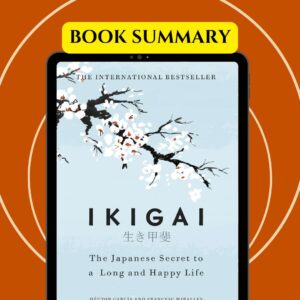Ikigai book summary – Key Ideas & Review
Ikigai is a Japanese concept that translates to a reason for being or a reason to wake up in the morning. It encompasses the idea of finding purpose and meaning in life, leading to a sense of fulfillment and satisfaction.
Ikigai originated in Okinawa, Japan, where the unique longevity of the population has been attributed to living in accordance with one’s ikigai. This concept reflects the Japanese cultural emphasis on finding joy in work and living a purposeful life.

Table of Contents
Basic Principles of Finding Purpose and Fulfillment
The core principles of ikigai revolve around the intersection of four key elements: passion, mission, vocation, and profession. By balancing these elements, individuals can uncover their true purpose and experience a deep sense of fulfillment.
What is Ikigai?
Meaning and Interpretation
Ikigai is more than just a hobby or career; it represents the convergence of what you love, what you are good at, what the world needs, and what you can be paid for. It is the sweet spot where passion, mission, vocation, and profession intersect.
Key Components of Ikigai
The key components of ikigai include discovering your passions, honing your talents, identifying how you can contribute to the world, and determining how to monetize your skills. It is about finding purpose in every aspect of your life.
How Ikigai Guides Life Choices
Ikigai serves as a guiding principle for decision-making, helping individuals prioritize activities and pursuits that align with their personal values and goals. It empowers individuals to lead a more intentional and fulfilling life.
The Four Pillars of Ikigai
Identifying Passions
Identifying your passions involves exploring activities that bring you joy and fulfillment. It is about understanding what truly excites and energizes you, leading to a sense of purpose and direction in life.
Cultivating Talents
Cultivating your talents involves honing your skills and strengths to reach your full potential. By investing in personal growth and development, you can leverage your abilities to make a meaningful impact on the world.
Finding What the World Needs
Finding what the world needs requires understanding how you can contribute positively to society. It involves aligning your unique talents and passions with the needs of others, fostering a sense of purpose and fulfillment through service.
Discovering What You Can Be Paid For
Discovering what you can be paid for involves leveraging your skills and expertise to create value in the marketplace. It is about finding a way to monetize your passions and talents while ensuring financial stability and security.
Finding Your Ikigai
Self-Reflection and Introspection
Self-reflection and introspection are essential for uncovering your ikigai. By delving deep into your values, interests, and strengths, you can gain clarity on what truly matters to you and what brings you a sense of fulfillment.
Balancing Passion, Mission, Vocation, and Profession
Balancing your passion, mission, vocation, and profession is the key to finding your ikigai. It requires aligning what you love, what the world needs, what you are good at, and what you can be paid for, creating a harmonious and purposeful life.
Exercise: Mapping Your Ikigai
An effective exercise for finding your ikigai is to create a visual map that depicts the intersection of your passions, talents, contributions to the world, and opportunities for financial gain. This exercise can help clarify your purpose and guide your life choices.
Benefits of Living According to Ikigai
Increased Happiness and Contentment
Living according to ikigai leads to increased happiness and contentment, as individuals are able to engage in activities that bring them joy and fulfillment. By pursuing their passions and aligning with their purpose, they experience a deep sense of satisfaction.
Boosted Well-Being and Health
Embracing ikigai is linked to improved well-being and health, as individuals who live purposefully are more likely to experience reduced stress and increased resilience. The fulfillment that comes from pursuing one’s ikigai can have positive effects on overall health and longevity.
Longevity and Fulfillment
Those who live according to their ikigai often report a profound sense of fulfillment and meaning in their lives. This deep sense of purpose can contribute to a longer and more fulfilling life, as individuals are more likely to prioritize activities that bring them joy and align with their core values.
This section provides an in-depth exploration of the concept of ikigai, covering its definition, key components, and the benefits of living a purposeful life. By understanding the principles of ikigai and how to find one’s purpose, individuals can navigate their life choices with clarity and fulfillment.
Chapter 1: The Search for the Meaning of Life
The opening chapter of Ikigai lays the groundwork for understanding the importance of purpose in shaping one’s happiness and well-being.
Summary of Key Concepts:
- The chapter emphasizes the significance of discovering one’s Ikigai as a guiding principle for life decisions.
- It explores the impact of purpose on overall satisfaction and emotional resilience.
Analysis of How Purpose Impacts Happiness:
- By aligning personal values with meaningful work, individuals can experience heightened levels of happiness and contentment.
- A sense of purpose provides a foundation for resilience in the face of challenges, fostering a positive outlook on life.
Chapter 2: Discovering What You Love
In Chapter 2, the authors delve into the essential component of identifying and nurturing personal passions to uncover one’s Ikigai.
Insight into Personal Passions:
- The chapter guides readers on exploring their interests and identifying activities that bring intrinsic joy and fulfillment.
- It highlights the transformative power of engaging in activities that resonate with one’s true self.
How Passion Leads to Fulfillment:
- By pursuing activities aligned with one’s passions, individuals can experience a profound sense of purpose and satisfaction.
- The chapter underscores the importance of incorporating these passions into daily life to enhance overall well-being.
Chapter 3: Finding What the World Needs
Chapter 3 of Ikigai focuses on the interconnectedness between personal fulfillment and making a positive impact on the world.
Understanding the Impact of Contribution:
- The authors explore how aligning personal values with societal needs can lead to a sense of purpose beyond oneself.
- By engaging in activities that serve a greater cause, individuals can experience a deep sense of fulfillment and belonging.
Aligning Personal Mission with Global Needs:
- The chapter emphasizes the importance of identifying ways to contribute to the well-being of others and society as a whole.
- It encourages readers to seek opportunities to make a meaningful difference in the world through their actions and choices.
Chapter 4: What You Can Be Paid For
In the final chapter, Ikigai addresses the practical aspect of translating passion into a sustainable profession.
Turning Passion into Profession:
- The authors discuss the value of finding a vocation that aligns with one’s passions and values, ensuring a harmonious balance in one’s professional life.
- They highlight the importance of pursuing work that not only fulfills personal interests but also provides a sense of purpose and financial stability.
Balancing Financial Needs with Personal Values:
- Ikigai underscores the significance of maintaining a balance between financial considerations and personal fulfillment when choosing a career path.
- It advocates for aligning one’s professional endeavors with a sense of purpose and meaning to cultivate long-term satisfaction and success.
Exercises and Practices in the Book
The book offers practical exercises and tools to help readers apply the principles of Ikigai to their daily lives.
- Through self-reflection exercises and guided journaling prompts, readers can gain deeper insights into their passions, values, and aspirations.
- The book provides actionable steps for aligning personal goals with a sense of purpose and fulfillment, facilitating a transformative journey towards living with intention.
Critique and Reviews
- Evaluation of the Book’s Effectiveness:
- Readers praise Ikigai for its profound insights and practical guidance on leading a purpose-driven life.
- The book’s clear and accessible writing style has resonated with individuals seeking ways to enhance their overall well-being and happiness.
- Reader Feedback and Testimonials:
- Many readers have expressed gratitude for the transformative impact Ikigai has had on their lives, inspiring them to pursue their passions and goals with renewed vigor.
- The book’s emphasis on the interconnectedness of passion, mission, vocation, and profession has resonated with a wide audience, sparking meaningful discussions on purposeful living.
Frequently Asked Questions (FAQs):
What is the main concept of Ikigai?
Ikigai is a Japanese philosophy that focuses on finding one’s purpose in life by balancing passions, talents, what the world needs, and what one can be paid for.
How can Ikigai benefit individuals?
Living according to Ikigai can lead to increased happiness, contentment, well-being, and a sense of fulfillment. It can also contribute to longevity and overall life satisfaction.
What are the four pillars of Ikigai?
The four pillars of Ikigai are identifying passions, cultivating talents, finding what the world needs, and discovering what you can be paid for. These aspects form the core of finding one’s purpose in life.
How can someone discover their Ikigai?
Discovering one’s Ikigai requires self-reflection, introspection, and a balance of passion, mission, vocation, and profession. Through exercises like mapping one’s Ikigai, individuals can uncover their unique purpose.
What are some practical exercises provided in Ikigai books to help readers find their purpose?
The book offers practical tips and tools for exploring Ikigai, such as mapping out one’s passions, talents, what the world needs, and what one can be paid for. These exercises can guide readers towards aligning their lives with purpose.
How can Ikigai help in achieving work-life balance?
Ikigai emphasizes aligning passion with profession, allowing individuals to find meaning and joy in their work. By pursuing what they love and what the world needs while being paid for it, individuals can strike a balance between personal fulfillment and career success.
Conclusion & Final Thoughts
In conclusion, Ikigai serves as a compelling blueprint for embracing purposeful living by harmonizing passion, mission, vocation, and profession.
Recap of Ikigai’s Core Principles:
- Finding one’s Ikigai involves aligning personal values and interests to lead a fulfilling life.
- The book encourages readers to explore their passions, contribute to the world, and pursue work that resonates with their true selves.
Inspiration for Embracing Purposeful Living:
- By integrating the key principles of Ikigai into their daily routines, individuals can cultivate a sense of purpose, joy, and fulfillment.
- The book serves as a timeless guide for those seeking to unlock their potential and lead a meaningful life aligned with their deepest values and aspirations.
Discover marketing services, interviews & publishing tools at SharingStories.





